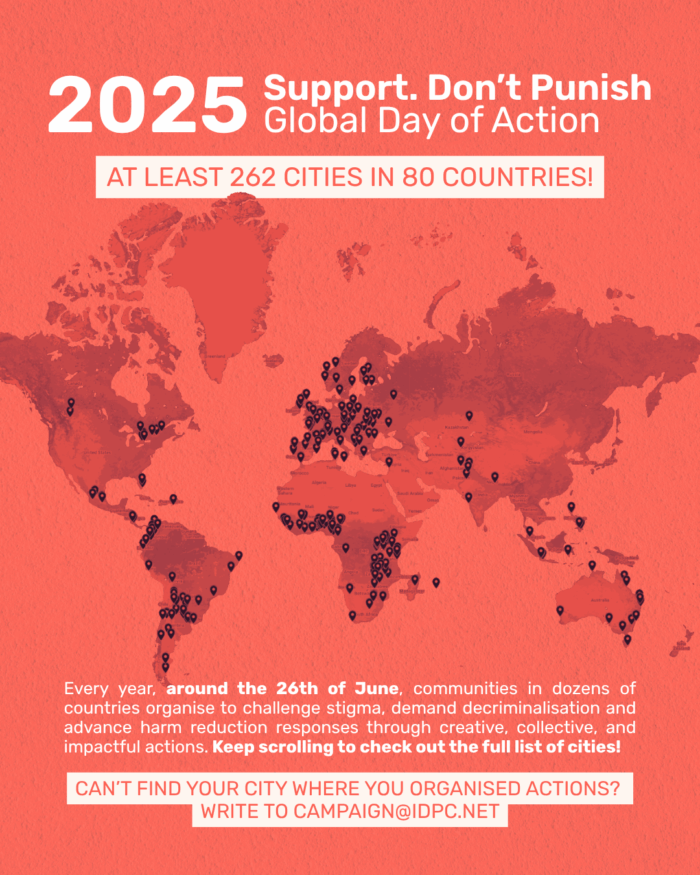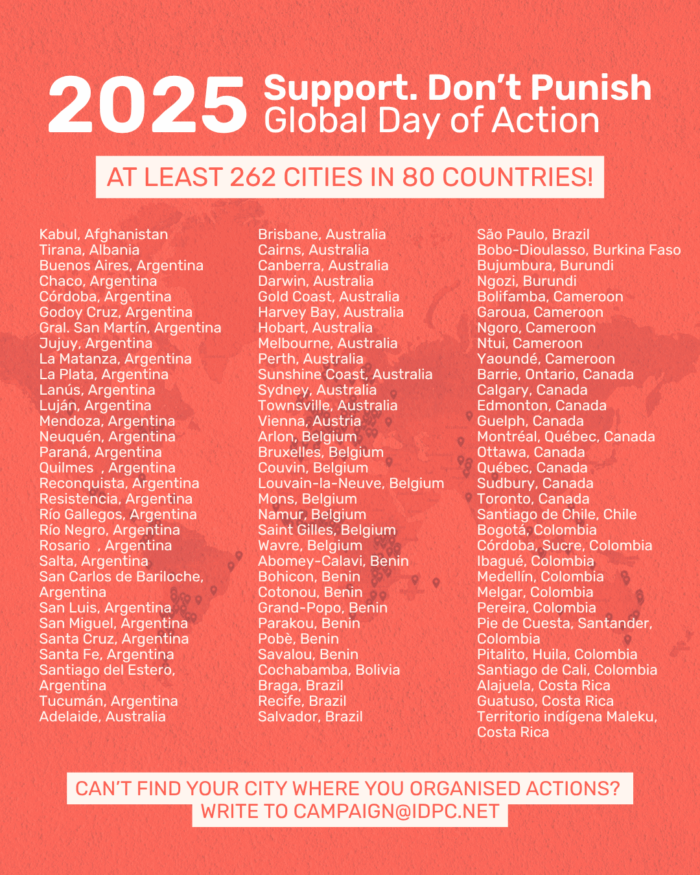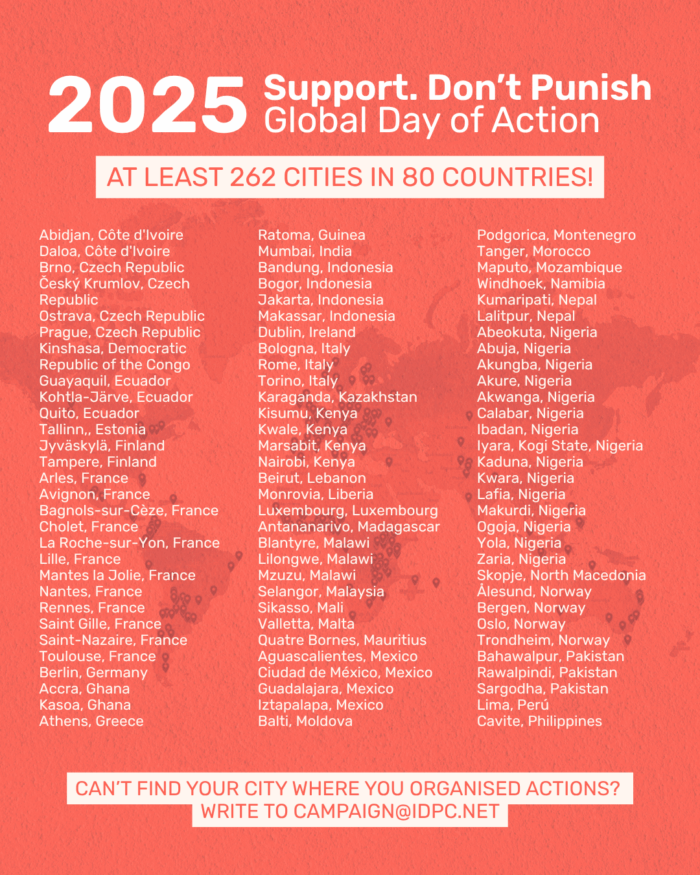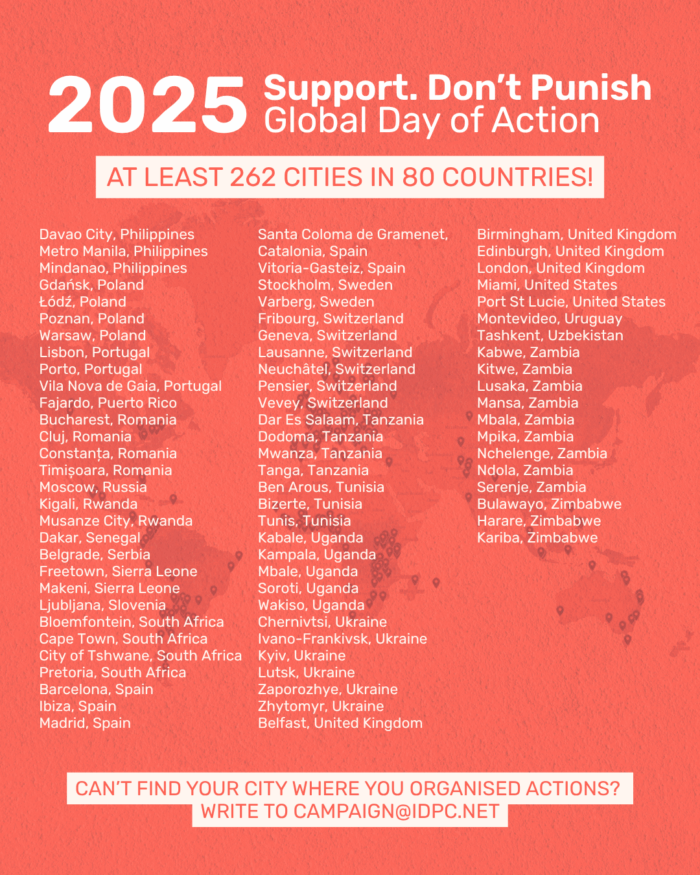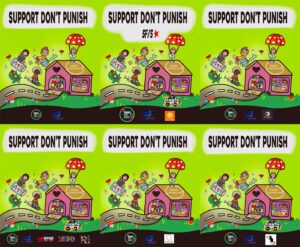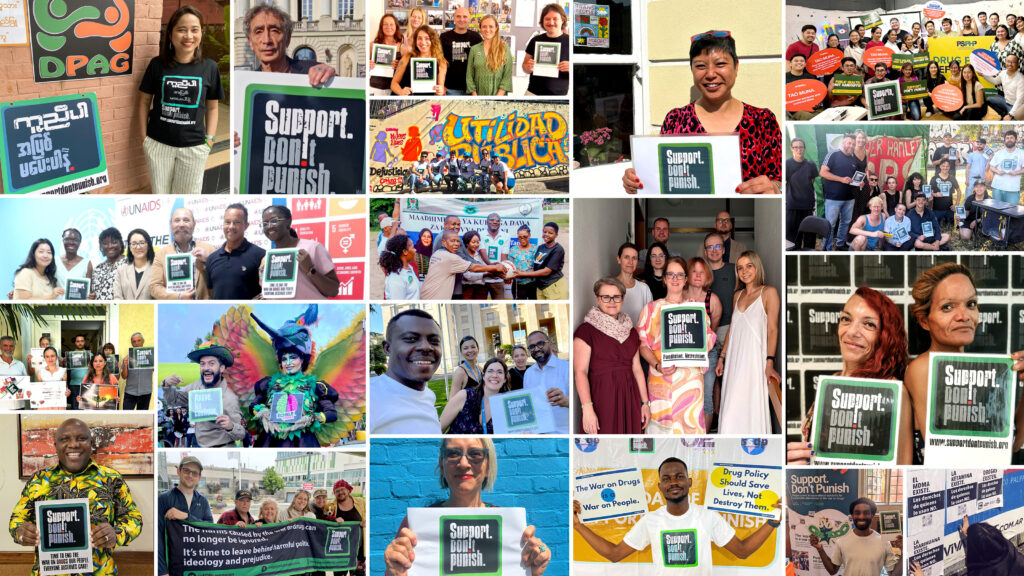By Juan Fernández Ochoa (IDPC Campaigns & Communications Officer)
Through murals, meetings, and mutual aid — in parks, community centres, and halls of power — thousands of people in at least 262 cities of 80 countries joined the 2025 Support. Don’t Punish Global Day of Action. In doing so, they demanded drug policies that promote care and dignity, not punishment.
For thirteen years, the campaign has worked to transform not just laws, but also the narratives that shape them — questioning whose stories are heard, and who holds power over other people’s destinies. This year, despite mounting backlash against harm reduction, escalating threats to human rights, and shrinking civic space, our movement showed, once again, that change cannot wait for permission — it starts with us.
The Global Day of Action is a tool to change hearts and minds, influence policy, and build power from below. It is our commitment to each other’s freedom. As highlighted in the campaign’s recent lifetime evaluation, its strength lies in the leadership of people and communities organising in concert, on their own terms. What unites us is not a single issue per se, but rather a shared understanding of the incalculable harm caused by the ‘war on drugs’, and how it participates in sustaining many forms of oppression. From that understanding, our efforts build a political horizon grounded in rights and solidarity.
This year’s actions vividly illustrated that horizon. Across regions, grassroots groups used the campaign to strengthen community leadership. From young Indigenous harm reductionists in Costa Rica producing awareness murals with their local communities, to cis- and trans-women sex workers in Guayaquil (Ecuador) creating spaces to discuss and develop practices of radical care, to women who use drugs in Bujumbura (Burundi) calling for for dignity and protection from local authorities, these actions embodied the campaign’s ethos: locally-grounded, collectively held, and strategically bold. Far from standalone events, these are stepping stones in movement-building — growing networks, fostering collaborative relationships, and centring the voices of people disproportionately impacted by criminalisation.
Several activities focused on catalysing policy and institutional change. In Ukunda (Kenya), people who use drugs convened county officials, healthcare workers and local media to find solutions to the collapse of harm reduction services following US-led foreign aid cuts. Community experiences informed a memorandum encouraging county budgets to do their part to mitigate catastrophe. In Tallinn (Estonia), the national network of people who use drugs similarly responded to the gutting of a successful peer-support programme by launching a campaign to reform municipal procurement systems. In Jakarta (Indonesia), a community network broke ground by engaging the military in a dialogue to advance voluntary and rights-based care, against the backdrop of increasing militarisation of the drug response. Despite facing different challenges, these efforts assert the right of communities to shape the very systems that govern their lives.
The campaign’s Global Day of Action was also a platform to shift public narratives and challenge stigma. In London (United Kingdom), campaigners set up a symbolic demonstration overdose prevention site to build local community support for these life-saving interventions and exert political pressure — including through media engagement. In Madrid (Spain), activists responded to an anti-drug-use citizen surveillance initiative by launching a satirical counter-campaign that highlighted the absurdity of the punitive logic by drawing parallels with a widely-accepted drug: alcohol. In Beirut (Lebanon), a social media campaign based on recorded street surveys demonstrated how drug law reform is not just necessary, but politically desirable. Through these actions, campaigners did not just seek to inform but to shift the way the public perceives drug policy — from a matter of control, to one of fairness and equality.
View this post on Instagram
The breadth of the campaign extends well beyond these examples. In Cavite (Philippines), organisers rooted in an abolitionist perspective led community-based political education highlighting the struggles of young people criminalised for their involvement in survival economies. In Wakiso (Uganda), young people leveraged recent legal changes to advocate for implementation that respects international human rights standards. In Ontario (Canada), people occupied the public space with testimonies, music and peer support to bring attention to a rollback in safer consumption sites. At the UN headquarters in Geneva, civil society and community networks, UN officials and government representatives gathered at the margins of the Human Rights Council to discuss recent developments on better aligning drug policy reform and human rights standards. These and the many more actions that took place around the 26th of June reaffirmed the campaign’s global reach and local power — a decentralised but interconnected movement building sustainable alternatives to oppressive norms and practices.

Community network, civil society and UN colleagues pose in front of the Human Rights Council on the occasion of the event commemorating the Global Day of Action.
The 2025 Global Day of Action was a testament to the resilience of our movement. In the face of multiple external pressures, communities mobilised with clarity and conviction. While the Day is a one-off occurrence, the lifeblood of the campaign’s success is the ongoing organising done by people whose lives are on the frontlines of the ‘drug war’ and whose work is often unrecognised and underfunded — if not overtly contested — by the powers that be. If we want this momentum to grow and endure, harm reduction advocacy and campaigning must be considered vital — not peripheral.
At the same time, we must redouble our capacity for ingenuity and learning — seeking inspiration in movements that have also struggled with scarcity and the antipathy of dominant forces, powered first-and-foremost by a shared sense of duty and purpose. From the street fundraisers of the Suffragettes, to the radical outrage of Stonewall, to the crowdfunders of the ‘green scarf’ reproductive rights movement in the Americas, to #EndSARS and its critique of state violence in Nigeria, collective action is nourished by resourcefulness.
We welcome any donation you can spare to the Support. Don’t Punish campaign’s solidarity fund, which helps sustain grassroots organising in the Global South. Beyond donations, this is an invitation to get involved and deepen our bond to each other — to organise, imagine, and build what we know is possible, for each other.
A kaleidoscope of commitment towards a freer world.
